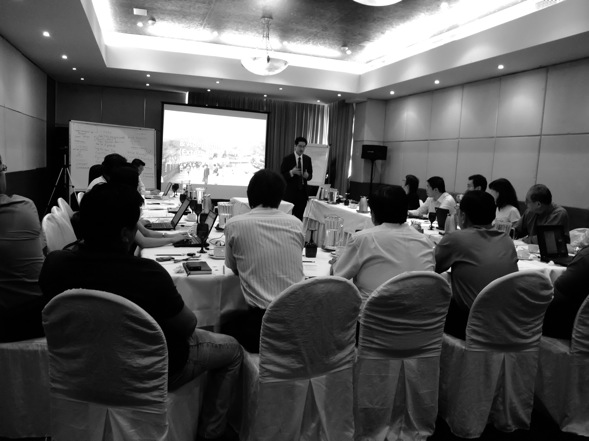Business approaches such as BlOcean and Six Sigma are often touted as “The Way” to turn under-performing companies into champions. Many Asian CEOs adopt these approaches with gusto. Some even attempt to apply these approaches one after another, to the confusion of staff. Like building a house without a master plan, these otherwise useful strategies soon turn into a jumble of poorly executed ideas. Instead of jumping on the next consulting fad, companies need to look within and develop their own way of life.
“If only HP knew what HP knows, we would be three times more productive,” Lew Platt, former Hewlett-Packard CEO, said.
It’s a pity that many Asian CEOs underestimate how much they can learn from their own organisations. Our research on Asian companies has shown that most do not dedicate time or resources to review work processes and identify useful ideas. We rarely find companies that are keen about learning from within or believe that talents within the company may have the skills to coach others. This is how we can tell if a company is going to be great or simply mediocre.
Companies cannot just adopt any business approach, because every company’s operating system is different. To avoid installing a Microsoft application onto a Mac platform, so to speak, you must first identify the system on which your company runs. Consider the following:
- The leadership style. What are the backgrounds and personal journeys of the management?
- The nature of work. Is it based on production or creation?
- The way talent is managed. What are the unspoken rules and rationale?
- The organisational dynamics. How do people interact and communicate?
- The quality of talent within the organisation. How long have they been in the company? What have they experienced?
- The roadmap. Where is the company heading in terms of growth and development?
Together these factors give a good view of the company’s operating system. In our firm we call the research phase Harness. We try to identify what exists within the organisation, so we can use them as building blocks or prepare the ground for better ideas to take root. Certain organisational patterns will emerge; how people are valued within the company and how they are expected to generate value. It may be an unwritten rule, but a certain work philosophy is present in every company we have served.
When probed, Asian bosses tend to dismiss that they have a unique approach in their work and put it down to an insignificant industry practice. This is a missed opportunity because certain approaches unique to the organisation are identified when you delve into their processes and interactions and these can generate extraordinary results.
Take football for example.
Dismissing their own unique practices is like saying football is just football and we play it like any other team. The rules may be the same, the pitches and goal posts may be of the same size, but how well the team scores is dependent on the type of training, team composition and how well the coach understands the team dynamics and tactics adopted for the full season.
How much time you spend to learn about the meaning of your work, what processes you have to profit from know-how and how you draw the best from your team matters. You need to consider the following to develop your own philosophy for success.
1. Identify key staff by how they play
Organise your company based on a deeper understanding of your staff’s individual approach to work. This approach is similar to how football coaches spend a lot of time observing their players before determining the team’s formation. Unfortunately in many companies human resource management is a rather static process. When management does not take an interest in reviewing the team and leaves it up to the HR department, inertia builds up and the organisation becomes more risk-adverse and less innovative.
This situation is similar to a football team with too many defenders and insufficient people to set up the play and score goals. In our organisational research, we identified some characters:
The defenders. They pay attention to details and work best when given specific instructions. They don’t mind playing the support role and avoid risk-taking. They could be in administrative roles or involved in quality assurance. You will need them in every department to make sure that things get done.
The mid-fielders. They are good at organising work, are sensitive to the people around them and understand organisational dynamics. They provide useful insights into workflows and give good advice on who needs to work with whom. You will need them as managers, planners or coordinators, so they can help the organisation scale up.
The strikers. They are the restless who thrive in challenging projects. They give unique insights but love to take shortcuts. They dislike bureaucracy and can be opportunistic. You need them to take risks, push boundaries and create growth. These types are good for new development, but you need to know how to manage their temperament.
The coach. This is usually reserved for management. They see the big picture and understand the rules of the game. They have the authority to take risks based on what they have observed. If they spend more time coaching staff, they will maximise their effect of shaping the organisation for success.
Every company is different, and organising a company based on its unique composition makes a difference to how it creates value.

Nearly 20 directors, senior managers and key executives was part of the Cyclect brand retreat facilitated by Consulus. (Click on the image to read the full case study.)
2. Find a reason for which to fight.
The next step in developing your philosophy for success is to identify your purpose. Many Asian companies tend to promote a task-oriented approach, but we have found that companies perform better when individuals understand the impact of their work. In identifying a meaningful purpose, you need to do the following:
Get the statement right. A purpose statement is a philosophy that is meant to guide the daily creation of business value. A past client, Fast Flow has the purpose statement “Seek and imagine new ways to solve tomorrow’s drainage challenges” acts as a reminder of how they approach drainage challenges through innovation.”
Make sure it is meant to last. Don’t limit a purpose statement to a period or a milestone. It is meant to act as a consistent compass to direct all your energies toward solving a problem or fulfilling a need.
Assess constantly. Once you have the purpose statement set up, you need to develop internal mechanisms on how to spot and highlight actions that reflect it. The CEO has to take up the responsibility of ensuring that the organisation follows through. Identify behaviors, rituals and processes to encourage practice. Reward emerging leaders who are able to identify with it and create value.
3. “Stay hungry. Stay Foolish” – The whole earth catalog
No philosophy remains relevant forever. We need to constantly observe, learn from our actions and keep tweaking.
Upon his return to Apple, Steve Jobs decided to hand over all the material intended for a corporate museum over to Stanford University. He did not want to rely on the past for the answers that Apple needed today. With a deep understanding of the strengths of his team and where the industry was going, he guided the team to develop new products that would dwarf his existing business units.
Apple managed to succeed in industries where their competitors believed that phones were simply phones and an operating system should remain as it is. By assuming that these philosophies will continue to bring success, those companies failed to heed the call of their own strikers who have been clamoring for change.
The top leadership within a company must have have the wisdom and courage to make the cuts and recalibrate when things are not going well. Keeping a healthy balance between learning and application is the best philosophy to building Asian brands that will shape a new world order.
Lawrence Chong is the CEO at Consulus.




